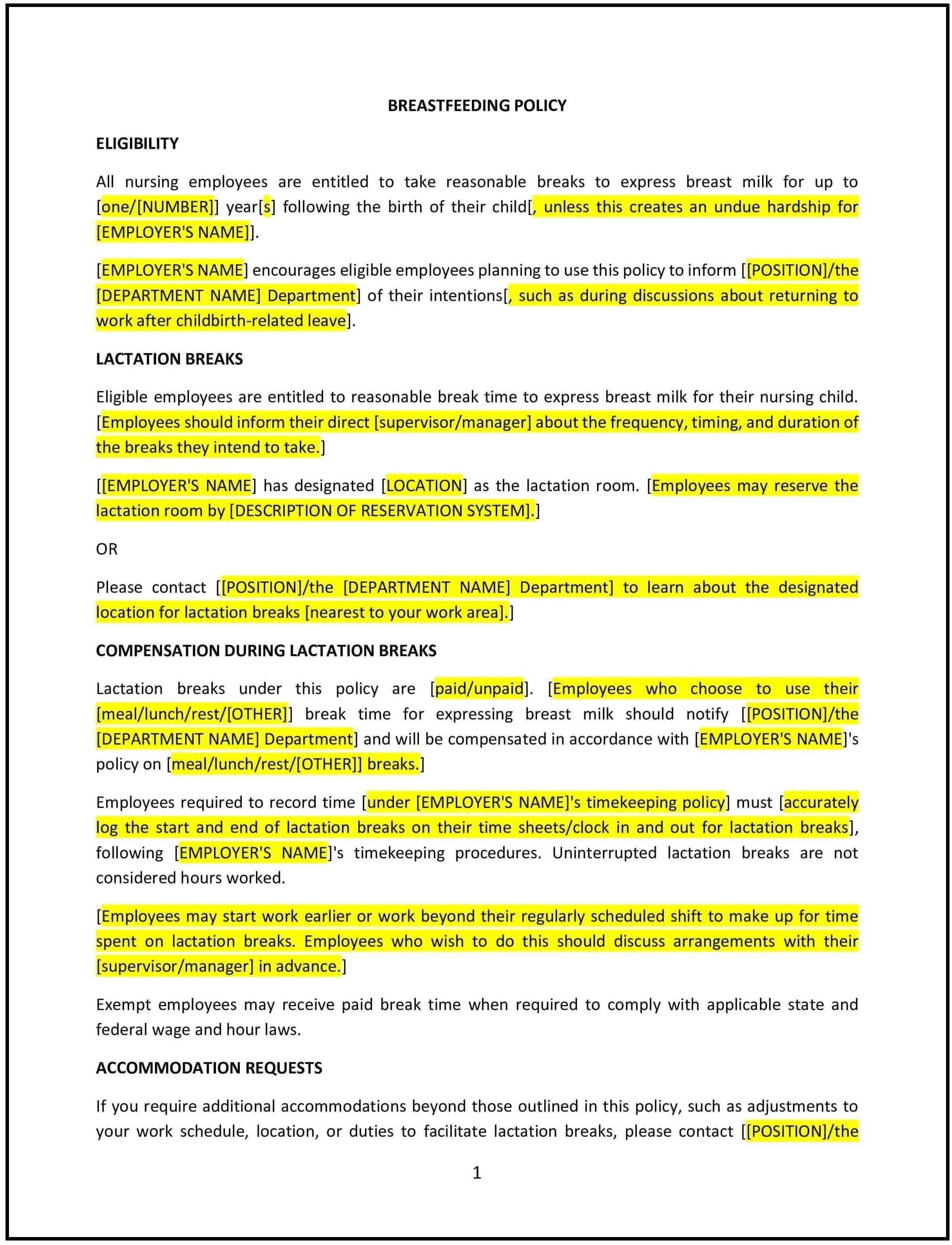Breastfeeding break policy (North Carolina): Free template
Got contracts to review? While you're here for policies, let Cobrief make contract review effortless—start your free review now.

Customize this template for free
Breastfeeding break policy (North Carolina)
A breastfeeding break policy helps North Carolina businesses support nursing mothers by providing designated time and space to express milk during the workday. The policy outlines the company’s commitment to providing reasonable accommodations for breastfeeding employees, including break times, private areas, and the flexibility needed to balance work and breastfeeding responsibilities.
By adopting this policy, businesses can demonstrate their support for working parents, comply with North Carolina and federal regulations, and create a family-friendly work environment.
How to use this breastfeeding break policy (North Carolina)
- Define eligible employees: Specify which employees are entitled to breastfeeding breaks, including full-time, part-time, and temporary workers. The policy should comply with North Carolina state laws and federal regulations under the Fair Labor Standards Act (FLSA).
- Set guidelines for break times: Outline the duration and frequency of breastfeeding breaks, ensuring they are reasonable and accommodate the needs of breastfeeding employees. For example, breaks should allow sufficient time to express milk, clean equipment, and rest.
- Provide a private space: Designate a private and sanitary space for breastfeeding employees to express milk, separate from bathrooms or public areas, to ensure privacy and hygiene.
- Address compensation: Specify whether breastfeeding breaks will be paid or unpaid. If the break time exceeds standard break periods, it may be unpaid, but employees should still be allowed time to express milk during paid work hours.
- Ensure flexibility: Provide flexibility in scheduling breastfeeding breaks to accommodate individual needs, ensuring that mothers have the time and space to pump or nurse as necessary.
- Reflect North Carolina-specific considerations: Ensure the policy aligns with North Carolina’s laws regarding workplace accommodations for breastfeeding mothers, as well as the federal Break Time for Nursing Mothers law.
Benefits of using this breastfeeding break policy (North Carolina)
This policy provides several benefits for North Carolina businesses:
- Supports working parents: By providing breastfeeding accommodations, businesses can support nursing mothers, helping them balance work and family responsibilities.
- Increases employee retention: A breastfeeding-friendly workplace can help retain talented employees by demonstrating the company’s commitment to supporting parents.
- Promotes workplace inclusivity: The policy helps create an inclusive work environment where employees feel valued and supported in their personal and professional roles.
- Enhances company reputation: A family-friendly workplace is often seen as an attractive employer, enhancing the company’s reputation and helping to attract top talent.
- Complies with legal requirements: The policy ensures that the business meets federal and state requirements related to breastfeeding accommodations, reducing the risk of legal challenges.
Tips for using this breastfeeding break policy (North Carolina)
- Communicate the policy clearly: Ensure all employees, particularly new parents, are aware of the breastfeeding break policy. Include it in the employee handbook and discuss it during onboarding.
- Provide appropriate facilities: Make sure the designated space for breastfeeding is private, clean, and comfortable, with all necessary supplies, such as a chair and electrical outlets for breast pumps.
- Offer flexible scheduling: Allow employees to take breaks as needed to pump or nurse, providing reasonable flexibility without compromising productivity.
- Review the policy regularly: Ensure that the policy is aligned with any changes in North Carolina labor laws, employee needs, or business requirements.